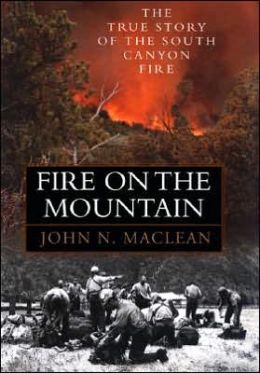Did you know...that fires are as unpredictable today as they were hundreds of years ago?
Norman MacLean, author of A River Runs Through It, wrote another book that isn't nearly as widely read called Young Men and Fire. MacLean, like many other young men his age living in western United States in the thirties, worked a regular job during the year, but then often either logged or fought wild fires during the summer. I
n 1949 a group of fifteen smoke jumpers--men who jumped out of a plan to fight fires in parts of the country that were unreachable by road--were killed when a wildfire up in an unreachable part of Montana turned on them. Because it was a job he'd often done himself, MacLean was haunted by the deaths. He spent a lifetime researching the incident, going back to the site, talking to survivors and writing his book. It includes the science of how a wildfire advances, as well as his more metaphysical theories about why it happened. MacLean was an atheist, but he believed that, every once in awhile, human beings owed the universe a terrible tragedy, and that's why things like this, genocide, the Titanic, etc. happen.
In 1994, when the South Canyon fire claimed the lives of fourteen fire fighters, MacLean's son, John MacLean, wrote a second book, Fire on the Mountain, chronicling that tragedy forty-five years later. (All excellent, if tragic, books, btw. Definitely worth reading.) MacLean, like his father--and probably because of him--was fascinated by fire tragedies and wrote many such books. He philosophized on what the cause and purpose of such tragedy might possibly be, but of course he had no more concrete answers than his father did.
Stating the obvious, perhaps, but it's both true and surprising. Here in the U.S we've already seen some wildfire tragedy this season. Just this past week, 10 firefighters were killed in Arizona. They all belonged to the same department--in Prescott, AZ--and represented roughly 20% of Prescott's force.
Fires are interesting things. They were a common part of medieval life and I'm sure of life in earlier periods as well. While most cities in Europe and the East were surrounded by stone walls, the structures within were largely made of wood. Moscow burned a number of times during the reign of Ivan the Terrible, taking hundreds with them, including many children. And of course there was the famous Great Fire of London in 1666, though that wasn't by far the only time it burned.
The fact is, cities were made of wood and most peasants, if they didn't live in wooden structures, lived in huts of mud or straw, with only thatch for roofs. All awesome materials for fire fuel.
You'd think with all our knowledge and technology that we'd have a much better grip on fires. Between accidents, people crammed into close quarters, and criminal arson, fires will always break out, but you'd think we'd have a better containment strategy for them.
But the fact is that fires are a force of nature that remain wild, unpredictable and--to a certain extent--unquenchable.
 |
| Source |
n 1949 a group of fifteen smoke jumpers--men who jumped out of a plan to fight fires in parts of the country that were unreachable by road--were killed when a wildfire up in an unreachable part of Montana turned on them. Because it was a job he'd often done himself, MacLean was haunted by the deaths. He spent a lifetime researching the incident, going back to the site, talking to survivors and writing his book. It includes the science of how a wildfire advances, as well as his more metaphysical theories about why it happened. MacLean was an atheist, but he believed that, every once in awhile, human beings owed the universe a terrible tragedy, and that's why things like this, genocide, the Titanic, etc. happen.
 |
| Source |
Fire has always been a part of human history and always will be. It helps us survive and also kills us. It's a force we cannot control or understand. It mystifies and fascinates us for that very reason. It is a force of destruction, but also a purifying force. When it becomes to grand or terrible for human beings to control, it becomes something akin to an F-5 tornado, or 10 point earthquake on the Richter scale. A force like the finger of Almighty God.
What do you think about the role of fire in human history? Do you agree with Norman MacLean's theory about human tragedy?

It's fascinating that even guys who are experts in fire can be caught by the unpredictability of fire. MacLean is 100% right Leisel. Good quote.
ReplyDeleteThere are fires that weren't remotely understandable until later technology could explain some of the phenomena surrounding them. The Great Peshtigo Fire (1871 - deadliest fire in U.S. history) told of fireballs falling from the sky and people suddenly combusting in flight to the river. I found it so compelling I had to write a novel set during that event -- THE RED FURY (Empire in Pine Book Two).
ReplyDelete